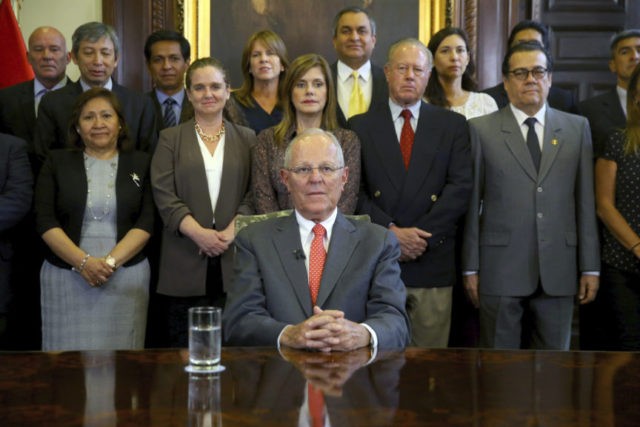Peru lived yet another tense moment on Friday morning as President Pedro Pablo Kuczynski threatened to withdraw his resignation from the nation’s highest office if Congress rejected it and pursued impeachment proceedings instead.
The Peruvian Congress had twice prepared an impeachment vote against him for alleged ties to Odebrecht, the disgraced Brazilian contracting firm accused of doling out bribes to nearly every prominent politician in South America. Kuczynski announced his resignation Wednesday, before a second impeachment vote.
A day before he resigned, the opposition party Popular Force released videos appearing to show Kuczynski’s attorney bribing Congressmen to vote against impeachment. Among those lawmakers was the brother of Popular Force party leader Keiko Fujimori, Rep. Kenji Fujimori.
Kenji called his sister a “delinquent” for releasing the video; Kuczynski, who beat Keiko for the presidency by less than one percent of the votes, resigned.
Before Kuczynski’s resignation could become officials, however, Congress needed to accept it. After an intense floor debate Thursday, Congress instead drafted a bill rejecting his resignation and charging him for “treason.” Peruvian federal law lists treason as one of several crimes for which a president can be removed. Previous attempts to impeach Kuczsynki instead cited “moral unfitness” to hold the office.
The “treason” draft bill prompted an outraged threat from Kuczynski to withdraw his resignation on Friday.
“The Congressional resolution that attempts to present as resignation as an impeachment is unacceptable,” he wrote on Twitter. “If it’s going to be like this, I withdraw my letter and subject myself to the regular impeachment process where I will exercise my right to a defense.”
Adding to the confusion was the absence of Vice President Martín Vizcarra, who was visiting Canada while the scandal unfolded. Vizcarra arrived in Lima on Friday and assume the presidency. “Faith and optimism,” he told reporters upon his return.
Peru will host the Summit of the Americas this month, which President Donald Trump is expected to attend and Vizcarra now expected to preside over.
Kuczynski no longer facing impeachment charges leaves his legal status in limbo. The government would have to now begin pressing charges against him as a private citizen, both for the Odebrecht situation and potentially in relation to the alleged impeachment bribes.
Prosecutors seeking more information on the depth of Odebrecht’s penetration of their government found evidence that Kuczynski accepted over $3 million in “consulting” fees from the firm between 2004 and 2007, when he served as Finance Minister of the country. The investigation triggered demands from Fujimori’s party that Kuczynski face impeachment, even though Keiko Fujimori is also facing allegations that she took over one million dollars from the firm. That accusation led Kenji Fujimori to resign from the Popular Force party and become a non-partisan lawmaker in early March.
While being savaged by the conservative Popular Force party over the Odebrecht scandal, Kuczynski, encouraged by Kenji, faced growing criticism from the nation’s left for his pardon of former Peruvian President Alberto Fujimori, the legislators’ father. As a former World Bank head and pro-business economist, Kuczynski could never rely on support from the far left, but the elder Fujimori’s arrest was a major victory for leftists, and undoing it broke up the little support Kuczynski had cobbled together to defeat Keiko Fujimori for the presidency.
In his resignation letter, Kuczynski blamed “a climate of ungovernability that does tremendous harm to the nation and does not allow us to advance” and dismissed the videos of his attorney discussing bribes with Kenji Fujimori as “edited and selectively tendencious.” He bitterly concluded that he hoped the country would “reach the unity and harmony that it so needs and that was denied to me.”

COMMENTS
Please let us know if you're having issues with commenting.